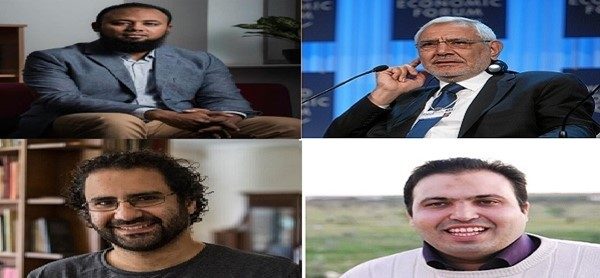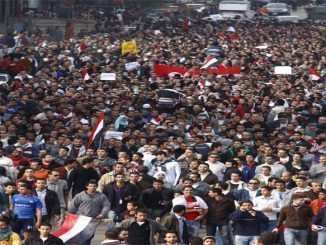
Egypt’s highest court has rejected appeals from Mohamed El-Baqer, Alaa Abdel Fattah, Dr. Abdel Moneim Aboul-Fotouh and Mohamed al-Qassas against inclusion on the terrorist list.
A few days ago, on 18 November, Egypt’s Court of Cassation rejected appeals presented by human rights lawyer Mohamed El-Baqer, blogger Alaa Abdel Fattah, and the Strong Egypt Party’s President Abdel Moneim Aboul-Fotouh and Deputy President Mohamed al-Qassas against their inclusion on the terrorist list, reported Daarb.
Almost a year ago, a court added all four to the terrorist listfor five years in Case 1781/2019 at the request of prosecutors, who accused them of “joining a group founded in violation of the law, incitement against the Egyptian state, and attempting to overthrow the regime.”
Defense lawyer Khaled Ali pointed out that the defendants have never been informed of the reasoning behind their inclusion on the terrorist list or the evidence supporting it, meaning they had no meaningful opportunity to challenge the designation.
Under Egypt’s repressive counterterrorism law, people on the terrorist list are subject to travel bans and asset freezes.
UN independent human rights experts have previously stated, “We are deeply disturbed about [Egypt’s] counter-terrorism law … and in particular the misuse of listing procedures at national level, to attack individuals engaged in human rights work.”
Mai El-Sadany, the managing director and legal and judicial director at the Tahrir Institute for Middle East Policy, noted that El-Baqer “will remain on the Terrorist List per Case No. 1781/2019, a case he’s never been questioned in.” She called it “an arbitrary, baseless, unjust decision.”
Aboul-Fotouh and al-Qassas’s trial is due to begin on 24 November, while the verdict in El-Baqer and Abdel Fattah’s case is set to be announced on December 20, according to Mada Masr.
In another example of the abuse of counterterrorism laws, Human Rights Watch (HRW) said on November 18 that the ongoing detentions of Juhayna founder Safwan Thabet and his son, Seif Thabet, show that “the government is using Egypt’s flawed terrorism laws to punish successful businessmen who refuse to surrender their property to the state.”
According to HRW’s sources, National Security Agency officers ordered the pair arrested—the father in December 2020 and his son two months later—after they refused to surrender the family’s shares in dairy and juice giant Juhayna.
Despite a lack of evidence against them, they have been kept in abusive conditions since being jailed on vague charges of “funding terrorism, undermining the national economy, and joining an unlawful organization.”
HRW’s assessment echoes that of Mada Masr and Amnesty International.
“The IMF and other financial institutions should rethink their approach before pouring more dollars into Egypt,” said Joe Stork, HRW’s deputy Middle East and North Africa director.
“The arrest and continued abusive detention of Safwan and Seif Thabet for refusing to hand their company over to the military make clear that efforts under previous programs to improve good governance and transparency are not working.”
This case is also emblematic of the ever-expanding reach of the military into the Egyptian economy and the continued opacity of military-owned businesses.
Detailing this trend, Robert Kubinec, an assistant professor of political science at New York University-Abu Dhabi, recently wrote, “Even though Abdel Fattah al-Sisi’s regime has largely fallen short of promises to revive the economy, businesspeople face serious consequences if they choose to back an alternative or even criticize his policies in public.
While investment and economic growth suffer, this stranglehold on elites outside the regime helps al-Sisi maintain power and suppress dissent.”



